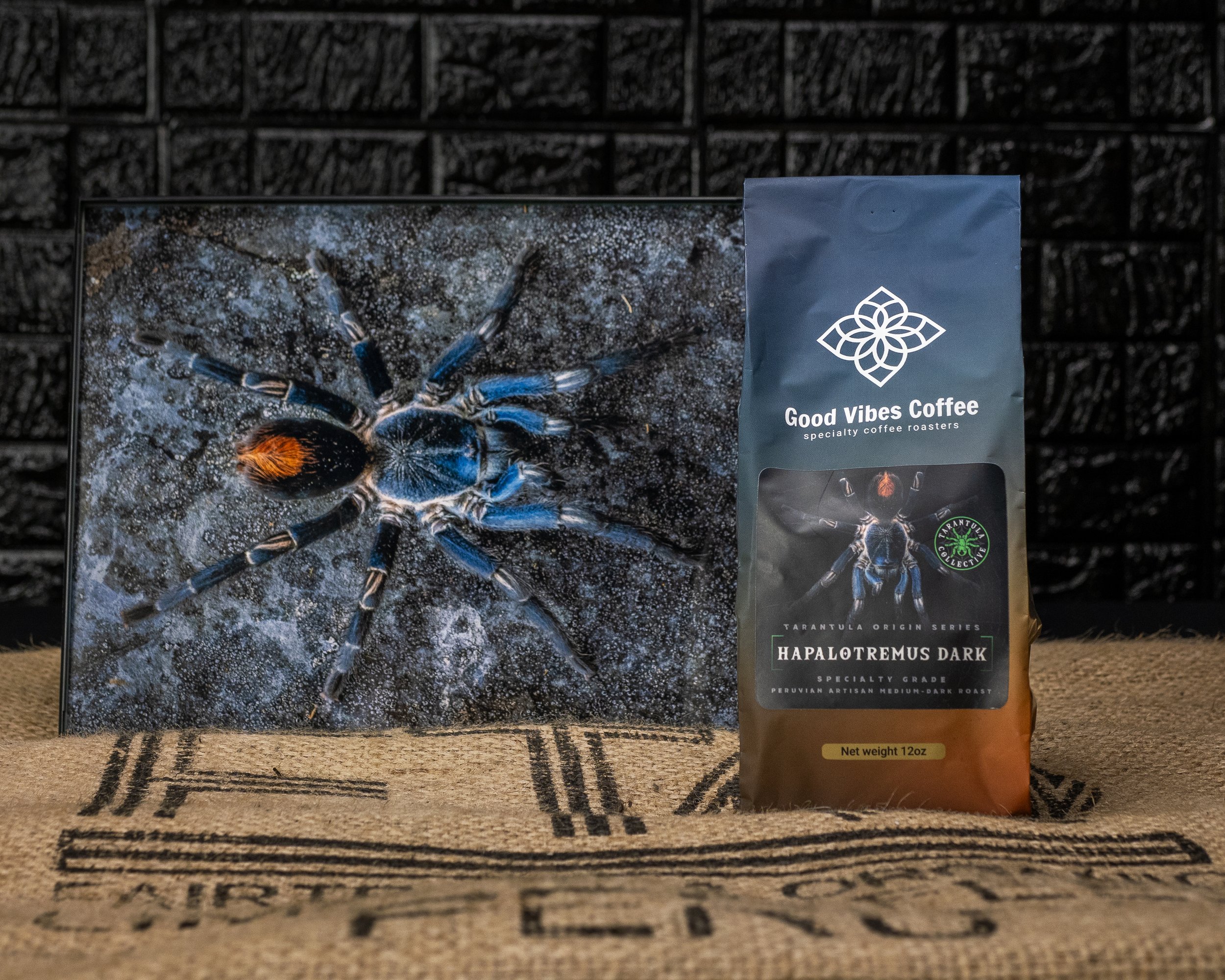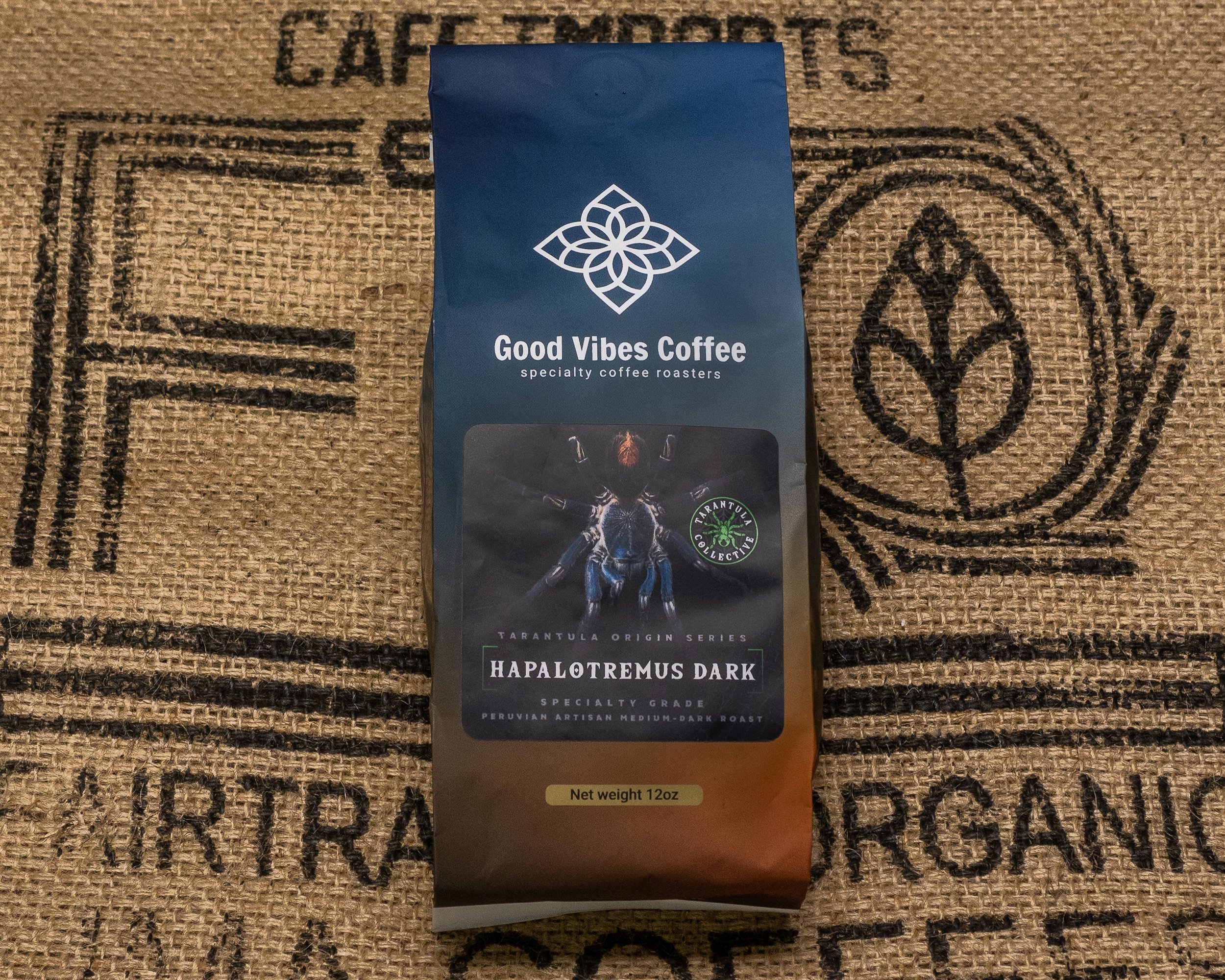Peru Tarantula Origin Series Coffee Gift Box
For the 3rd Tarantula Origin Coffee Series we are focusing on the species of Peru! Specifically two undescribed species I documented while traveling the Andes Mountains looking for rare, high elevation tarantula species. We have the undescribed Bistropelma species featured with the “Bistropelma Blonde” which is a light-medium artisan, small batch roast with hints of brown sugar, caramel, and dried plum. The other coffee is named after one of the undescribed Hapalotremus species and called “Hapalotremus Dark” and is a medium-dark roast with hints of caramel, dark chocolate, and roasted almond.
The Gift Box include one 12oz bag of the Bistroplema Blonde and one 12oz bag of the Hapalotremus Dark. It also includes TWO (1 of each species) 8×10, SIGNED, glossy macro photograph I took of each species while in Peru. ONE Limited Edition Tarantula Collective coffee mug in purple & green. One coaster from Spider Shoppe. One acrylic ornament from Tarantula Cribs. Tarantula Collective stickers. A coupon for 10% off your order and ONE FREE spiderling w/ purchase from Tie Dyed Tarantula as well as a few of their stickers.
The COOLEST addition this year is the HANDMADE Hapalotremus sculpture made by Ssett Ninaq, an indigenous Peruvian female artist ( @ssett_vincent on Instagram) who is married to Josh, the guide on our Peruvian tarantula tour. She sculpted and painted each piece, by hand, based on the Hapalotremus tarantulas we found in the Cusco region. So each sculpture is a slightly different, unique piece of art!
The beans are sourced from the Warmikuna cluster in the Junin region, which is between the Andes Mountains and the Amazon Rainforest, not far from where we were finding and documenting all these amazing species of tarantula. “Warmikuna” means “women” in Quechua, which is one of Peru’s oldest languages. These beans are certified fair trade and organic and come from farms owned and operated by indigenous, Peruvian women, many of Quechua dissent. The thin air, soaring altitudes, and fertile soil throughout Peru come together to form a breathtaking environment where these coffee plants thrive!
For the 3rd Tarantula Origin Coffee Series we are focusing on the species of Peru! Specifically two undescribed species I documented while traveling the Andes Mountains looking for rare, high elevation tarantula species. We have the undescribed Bistropelma species featured with the “Bistropelma Blonde” which is a light-medium artisan, small batch roast with hints of brown sugar, caramel, and dried plum. The other coffee is named after one of the undescribed Hapalotremus species and called “Hapalotremus Dark” and is a medium-dark roast with hints of caramel, dark chocolate, and roasted almond.
The Gift Box include one 12oz bag of the Bistroplema Blonde and one 12oz bag of the Hapalotremus Dark. It also includes TWO (1 of each species) 8×10, SIGNED, glossy macro photograph I took of each species while in Peru. ONE Limited Edition Tarantula Collective coffee mug in purple & green. One coaster from Spider Shoppe. One acrylic ornament from Tarantula Cribs. Tarantula Collective stickers. A coupon for 10% off your order and ONE FREE spiderling w/ purchase from Tie Dyed Tarantula as well as a few of their stickers.
The COOLEST addition this year is the HANDMADE Hapalotremus sculpture made by Ssett Ninaq, an indigenous Peruvian female artist ( @ssett_vincent on Instagram) who is married to Josh, the guide on our Peruvian tarantula tour. She sculpted and painted each piece, by hand, based on the Hapalotremus tarantulas we found in the Cusco region. So each sculpture is a slightly different, unique piece of art!
The beans are sourced from the Warmikuna cluster in the Junin region, which is between the Andes Mountains and the Amazon Rainforest, not far from where we were finding and documenting all these amazing species of tarantula. “Warmikuna” means “women” in Quechua, which is one of Peru’s oldest languages. These beans are certified fair trade and organic and come from farms owned and operated by indigenous, Peruvian women, many of Quechua dissent. The thin air, soaring altitudes, and fertile soil throughout Peru come together to form a breathtaking environment where these coffee plants thrive!
For the 3rd Tarantula Origin Coffee Series we are focusing on the species of Peru! Specifically two undescribed species I documented while traveling the Andes Mountains looking for rare, high elevation tarantula species. We have the undescribed Bistropelma species featured with the “Bistropelma Blonde” which is a light-medium artisan, small batch roast with hints of brown sugar, caramel, and dried plum. The other coffee is named after one of the undescribed Hapalotremus species and called “Hapalotremus Dark” and is a medium-dark roast with hints of caramel, dark chocolate, and roasted almond.
The Gift Box include one 12oz bag of the Bistroplema Blonde and one 12oz bag of the Hapalotremus Dark. It also includes TWO (1 of each species) 8×10, SIGNED, glossy macro photograph I took of each species while in Peru. ONE Limited Edition Tarantula Collective coffee mug in purple & green. One coaster from Spider Shoppe. One acrylic ornament from Tarantula Cribs. Tarantula Collective stickers. A coupon for 10% off your order and ONE FREE spiderling w/ purchase from Tie Dyed Tarantula as well as a few of their stickers.
The COOLEST addition this year is the HANDMADE Hapalotremus sculpture made by Ssett Ninaq, an indigenous Peruvian female artist ( @ssett_vincent on Instagram) who is married to Josh, the guide on our Peruvian tarantula tour. She sculpted and painted each piece, by hand, based on the Hapalotremus tarantulas we found in the Cusco region. So each sculpture is a slightly different, unique piece of art!
The beans are sourced from the Warmikuna cluster in the Junin region, which is between the Andes Mountains and the Amazon Rainforest, not far from where we were finding and documenting all these amazing species of tarantula. “Warmikuna” means “women” in Quechua, which is one of Peru’s oldest languages. These beans are certified fair trade and organic and come from farms owned and operated by indigenous, Peruvian women, many of Quechua dissent. The thin air, soaring altitudes, and fertile soil throughout Peru come together to form a breathtaking environment where these coffee plants thrive!












